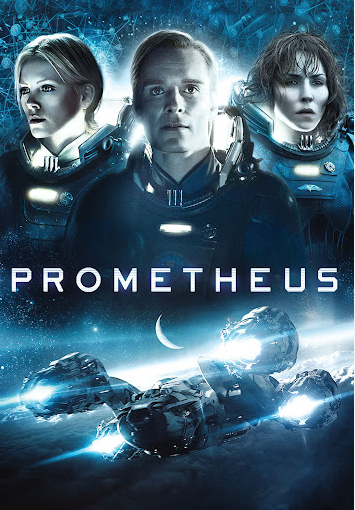1. Plot Summary
In 2089, archaeologists Dr. Elizabeth Shaw (Noomi Rapace) and Charlie Holloway (Logan Marshall-Green) unearth ancient star maps from multiple early human cultures, which they interpret as an invitation from humanity’s creators—called the Engineers. They gain funding from aging industrialist Peter Weyland (Guy Pearce) and embark aboard the spaceship Prometheus, accompanied by a crew and an android, David (Michael Fassbender), to the distant moon LV-223.
On LV-223, they discover vast alien ruins, mysterious large stone cylinders, and evidence that the Engineers may have intended to use biological weapons against humanity.
Shaw pushes to find answers about creation, faith, and mortality. As the crew investigates deeper, they face horrifying life forms, betrayal, and the consequences of their curiosity.
The journey becomes less about meeting creators and more about confronting the dangers that lurk behind creation itself—and the hubris of humans seeking to play god.
2. Notable Elements
What Makes Prometheus Stand Out
- Visual & production design: The alien architecture, ruined temples, alien “Engineer” statues, and cavernous interiors all evoke grandeur. Critics have praised its haunting aesthetic.
- Michael Fassbender’s performance as David: David is posed between servitude and curiosity, and Fassbender brings nuance—ambiguous loyalties, peculiar mannerisms, and eerie calmness. Many see his portrayal as a highlight.
- Ambitious themes: Prometheus doesn’t shy from big questions—creation, religion, mortality, identity. It wants to be more than just monster horror.
- Memorable horror sequences: The self-surgery “Med Pod” scene (Shaw extracting an alien parasite) is visceral, bold, and unforgettable.
- Layered ambiguity & mystery: The film raises many mysteries and refuses to answer all of them—a deliberate choice that keeps audiences thinking.
What Doesn’t Always Land
- Characters making poor choices: Some crew members act in ways critics called illogical or frustrating (e.g. wandering alone in mapped corridors, experimenting unwisely).
- Loose or unresolved plot threads: The film introduces many ideas and questions but leaves several unaddressed or murky.
- Tonality and pacing imbalance: After a strong opening, the film sometimes slows. Its mixture of philosophical moments, horror, and sci-fi can feel uneven.
- Overreliance on visual spectacle: At times, the ambition of visuals overshadows narrative clarity, making parts of the story feel more collage than fully coherent.
3. Themes and Messages
- Creator & creation / playing god: The central drive is human desire to meet the ones who made us, to understand why. But the film warns of hubris—seeking gods may provoke danger.
- Faith vs science: Shaw is motivated by belief and needs confirmation, while others (like Holloway) approach from skeptical rationalism. Their clash is thematic.
- Identity, artificial life, rebellion: The film questions what it means to be created, and the android David’s perspective (disdain, curiosity, mimicry) is key in that exploration.
- Mortality, decay, rebirth: The Engineers’ use of a “black goo” that transforms, mutates, decays, and re-creates is a visceral symbol of life’s fragility and ambiguity.
- The dangers of forbidden knowledge: Curiosity is a double-edged sword; seeking truth can bring annihilation. This is a classical sci-fi warning.
In relation to holiday sentiment: Prometheus doesn’t evoke holiday warmth, but its concern with origins, existential longing, and the search for connection resonates with introspective or spiritual sentiments often associated with festive reflection.
4. Personal Impressions
What I admired:
- I love that it takes risks. It aspires to epic scale, philosophical depth, and horror in one package.
- The visuals and design often feel sublime—beautifully brutal alien ruins, moody lighting, immersive environments.
- Fassbender’s David is magnetic—he adds tension even when doing little, with posture, voice, and inscrutable motives.
- The Med Pod scene lingers—it’s among the most disturbing and original horror bits in modern sci-fi.
Where it falters (for me):
- I sometimes felt the narrative thread was thin—ideas over substance. Some mysteries frustrated me rather than enchanted me.
- The decisions characters make occasionally feel driven by necessity of plot, not by believable logic.
- After the strong midsection, the third act feels loaded and overwrought: too many reveals, too many climaxes.
- The balance between inquiry (Who are we? Who made us?) and survival horror is sometimes shaky—it leans too far into cosmic spectacle at expense of personal stakes.
5. Audience Recommendations
You’ll especially enjoy Prometheus if you:
- Are a fan of philosophical sci-fi—films that ponder creation, identity, and cosmic horror.
- Like aesthetics, bold design, and visual ambition in your sci-fi.
- Appreciate characters who are flawed, morally conflicted, and motivated by faith, ambition, or curiosity.
- Don’t mind ambiguity, open endings, and stories that invite discussion more than resolution.
You might be less enthused if you:
- Prefer clean, tightly plotted narratives with few loose ends.
- Want characters whose logic always feels airtight (Prometheus expects you to tolerate imperfections).
- Dislike shifts between slow philosophical beats and visceral horror.
6. Conclusion & Rating
Prometheus (2012) is an ambitious, often dazzling journey into questions of creation, faith, and the unknown. It doesn’t always tie itself neatly, and some of its mystery may frustrate, but it gives science fiction a grand canvas and some potent moments that linger. It’s a film to argue about, not merely to watch.
Final Recommendation: Watch it. Let its questions unsettle you, enjoy the visuals, and debate its puzzles. If you like films that don’t spoon-feed answers, Prometheus is a rewarding experience.
⭐ Rating: 4 / 5
Watch more:




